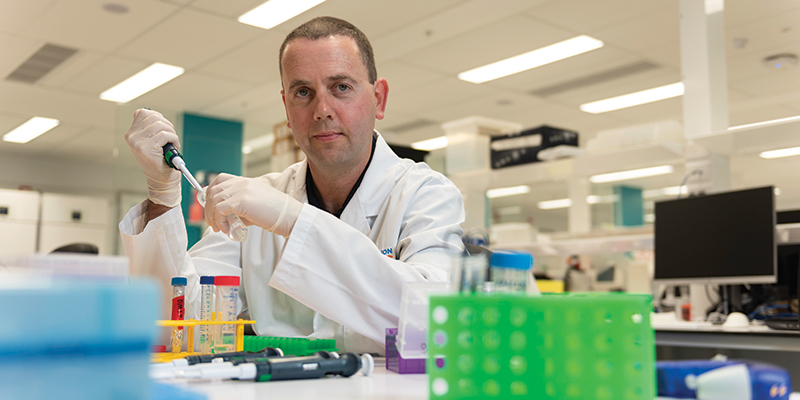Search
Research
Conventional Therapies Deplete Brain-Infiltrating Adaptive Immune Cells in a Mouse Model of Group 3 Medulloblastoma Implicating Myeloid Cells as Favorable Immunotherapy TargetsMedulloblastoma is the most common childhood brain cancer. Mainstay treatments of radiation and chemotherapy have not changed in decades and new treatment approaches are crucial for the improvement of clinical outcomes. To date, immunotherapies for medulloblastoma have been unsuccessful, and studies investigating the immune microenvironment of the disease and the impact of current therapies are limited.
Research
PI3K/mTOR is a therapeutically targetable genetic dependency in diffuse intrinsic pontine gliomaDiffuse midline glioma (DMG), including tumors diagnosed in the brainstem (diffuse intrinsic pontine glioma; DIPG), are uniformly fatal brain tumors that lack effective treatment.
Research
Pediatric pineoblastoma: A pooled outcome study of North American and Australian therapeutic dataPineoblastoma is a rare brain tumor usually diagnosed in children. Given its rarity, no pineoblastoma-specific trials have been conducted. Studies have included pineoblastoma accruing for other embryonal tumors over the past 30 years.
Research
Geldanamycin treatment does not result in anti-cancer activity in a preclinical model of orthotopic mesotheliomaMesothelioma is characterised by its aggressive invasive behaviour, affecting the surrounding tissues of the pleura or peritoneum. We compared an invasive pleural model with a non-invasive subcutaneous model of mesothelioma and performed transcriptomic analyses on the tumour samples.

News & Events
The Kids Research Institute Australia researchers share in TPCHRF fundingEight The Kids Research Institute Australia researchers are among those who have received grant funding from the Telethon-Perth Children’s Hospital Research Fund (TPCHRF).
Research
Exploiting the reactive oxygen species imbalance in high-risk paediatric acute lymphoblastic leukaemia through auranofinThe prognosis for high-risk childhood acute leukaemias remains dismal and established treatment protocols often cause long-term side effects in survivors. This study aims to identify more effective and safer therapeutics for these patients.
Research
Malignant Pleural Effusions—A Window Into Local Anti-Tumor T Cell Immunity?The success of immunotherapy that targets inhibitory T cell receptors for the treatment of multiple cancers has seen the anti-tumor immune response re-emerge as a promising biomarker of response to therapy. Longitudinal characterization of T cells in the tumor microenvironment (TME) helps us understand how to promote effective anti-tumor immunity. However, serial analyses at the tumor site are rarely feasible in clinical practice.
Research
Management of patients with diffuse intrinsic pontine glioma in Australia and New Zealand: Australian and New Zealand Children's Haematology/Oncology Group position statementThe main mission of the Australian and New Zealand Children's Haematology and Oncology Group is to develop and facilitate local access to the world's leading evidence-based clinical trials for all paediatric cancers, including brain tumours, as soon as practically possible.

News & Events
Pioneering research could be key to keeping cancer in checkCancer research is being reimagined after a collaboration between The Kids Research Institute Australia, the Peter Doherty Institute for Infection and Immunity.
Research
Case report: congenital intraventricular meningioma demonstrated with fetal MRICongenital intracranial meningiomas are rare lesions. We present a case of congenital intraventricular cystic meningioma, initially characterized with fetal MRI and confirmed postnatally with histopathology. To our knowledge, this is the first in vivo description of a congenital meningioma with fetal MRI. The fetal MRI was able to characterize the lesion as an atypical intraventricular mass which was separate from the choroid plexus, differentiating the mass from a choroid plexus neoplasm.
